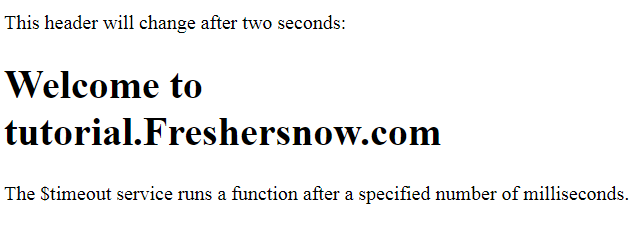AngularJS Services: AngularJS uses individualized objects called services to perform specialized tasks. Filters and controllers rely on services on an as-needed basis. Services typically use the dependency injection mechanism. There are many services built into AngularJS, such as $route, $location, $window, $http, etc., each in control of a different task.
The $http service, for example, contains everything necessary to access and collect data from a web server and pass it on to the $route service, which in turn defines it. You can also create custom services and reuse them throughout your code. Built-in services are easy to identify in code because they always begin with the dollar sign ($).
AngularJS Services Example
<!DOCTYPE html>
<html>
<script src="http://ajax.googleapis.com/ajax/libs/angularjs/1.4.8/angular.min.js></script>
<body>
<div ng-controller="exampleCtrl" ng-app="exampleApp">
<p>The url address of this page is:</p>
<h3>{{exampleUrl}}</h3>
</div>
<script>
var app = angular.module('exampleApp', []);
app.controller('example Ctrl', function($scope,
$location) {
$scope.example Url = $location.absUrl();
});
</script>
</body>
</html>
Angular JS Services Example Output
<p>The url address of this page is:</p>
https://tutorials.freshersnow.com/angular-js/angular-js-services-with-example/
The $http Service
The $http service is a commonly-used service in AngularJS. A request to the server is initiated by the service and the application handles the response.
The $http Service Example
Request data from the server using the $http service:
<!DOCTYPE html>
<html>
<script src="http://ajax.googleapis.com/ajax/libs/angularjs/1.4.8/angular.min.js"></script>
<body>
<div ng-app="example App"
ng-controller="exampleCtrl">
<h1>{{exampleWelcome}}</h1>
</div>
<script>
var app = angular.module('exampleApp', []);
app.controller('exampleCtrl', function($scope,
$http) {
$http.get("welcome.htm").then(function
(response) {
$scope.exampleWelcome = response.data;
});
});
</script>
</body>
</html>
The $http Service Example Output
Welcome to AngularJS!
The $timeout Service
Here, we use a window.setTimeout() function to get $timeout service.
$timeout Service Example
<!DOCTYPE html>
<html>
<script src="https://ajax.googleapis.com/ajax/libs/angularjs/1.6.9/angular.min.js"></script>
<body>
<div ng-app="myApp" ng-controller="myCtrl">
<p>This header will change after two seconds:</p>
<h1>{{myHeader}}</h1>
</div>
<p>The $timeout service runs a function after a specified number of milliseconds.</p>
<script>
var app = angular.module('myApp', []);
app.controller('myCtrl', function($scope, $timeout) {
$scope.myHeader = "Hello!";
$timeout(function () {
$scope.myHeader = "Welcome to tutorial.Freshersnow.com";
}, 2000);
});
</script>
</body>
</html>
$timeout Service Example Output

$interval Service
The window.setInterval function is used for $interval service.
$interval Service Example
<!DOCTYPE html>
<html>
<script src="https://ajax.googleapis.com/ajax/libs/angularjs/1.6.9/angular.min.js"></script>
<body>
<div ng-app="myApp" ng-controller="myCtrl">
<p>The time is:</p>
<h1>{{theTime}}</h1>
</div>
<p>The $interval service runs a function every specified millisecond.</p>
<script>
var app = angular.module('myApp', []);
app.controller('myCtrl', function($scope, $interval) {
$scope.theTime = new Date().toLocaleTimeString();
$interval(function () {
$scope.theTime = new Date().toLocaleTimeString();
}, 1000);
});
</script>
</body>
</html>
$interval Service Example Output
Create Own Service
Connect your service to the module to create your own service.
Create Own Service Example
<!DOCTYPE html>
<html>
<script src="https://ajax.googleapis.com/ajax/libs/angularjs/1.6.9/angular.min.js"></script>
<body>
<div ng-app="myApp" ng-controller="myCtrl">
<p>The hexadecimal value of 10 is:</p>
<h1>{{hex}}</h1>
</div>
<p>A custom service with a method that converts a given number into a hexadecimal number.</p>
<script>
var app = angular.module('myApp', []);
app.service('hexafy', function() {
this.myFunc = function (x) {
return x.toString(16);
}
});
app.controller('myCtrl', function($scope, hexafy) {
$scope.hex = hexafy.myFunc(10);
});
</script>
</body>
</html>


